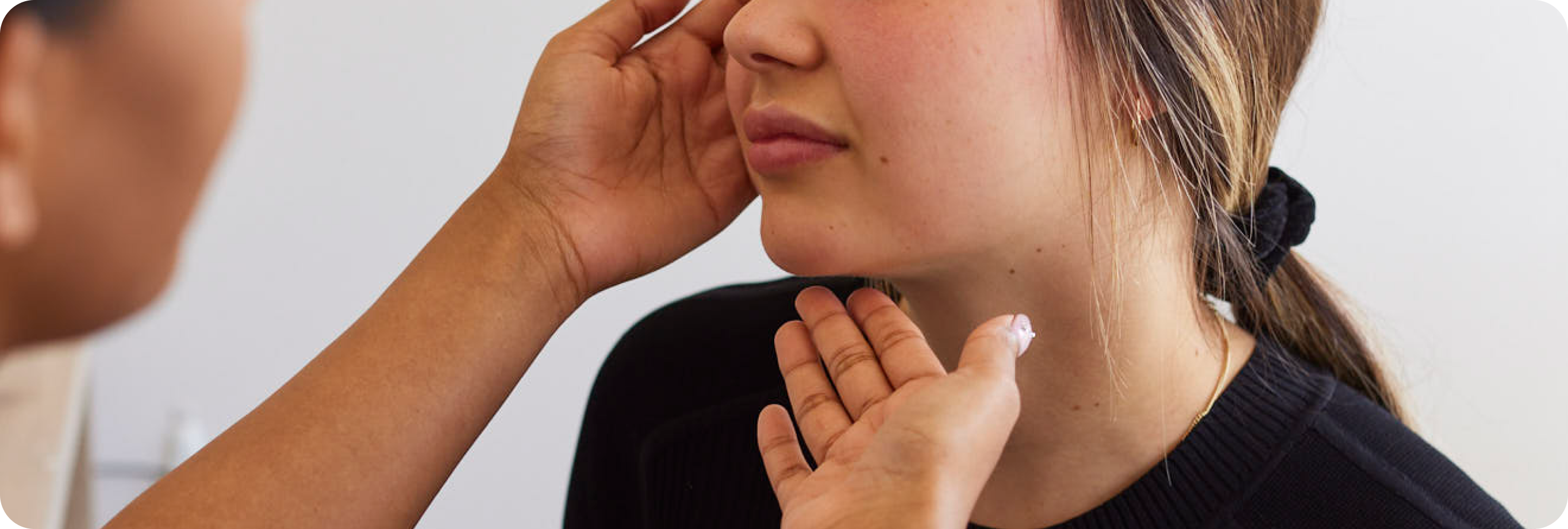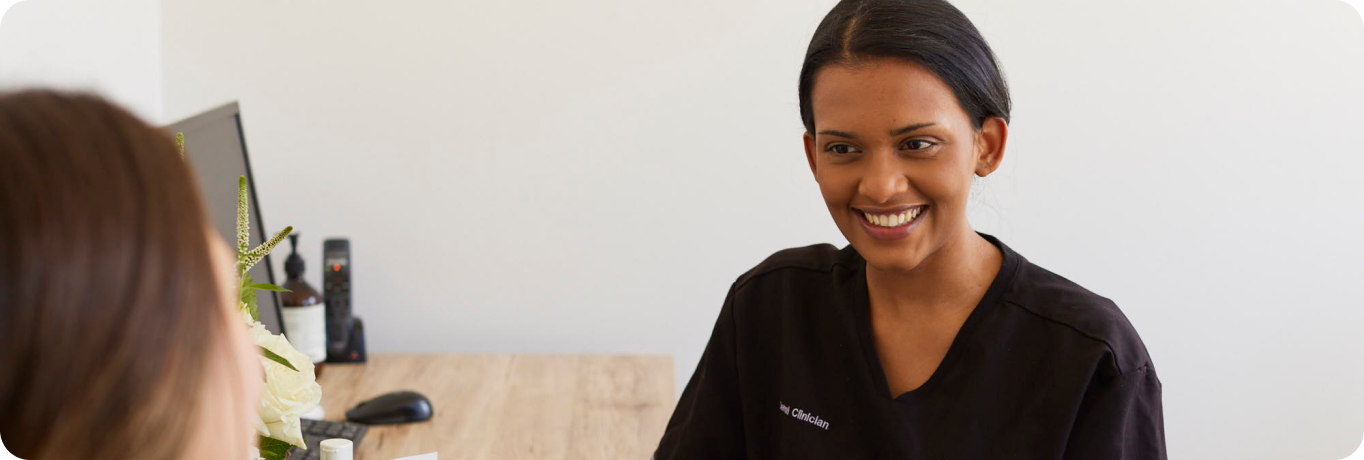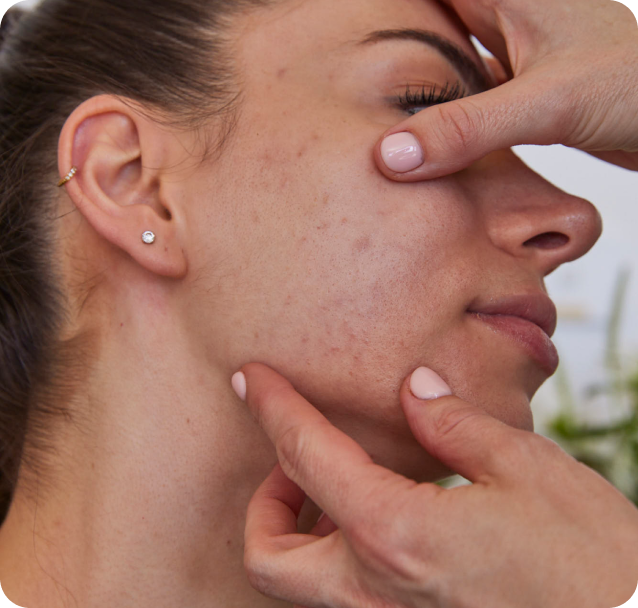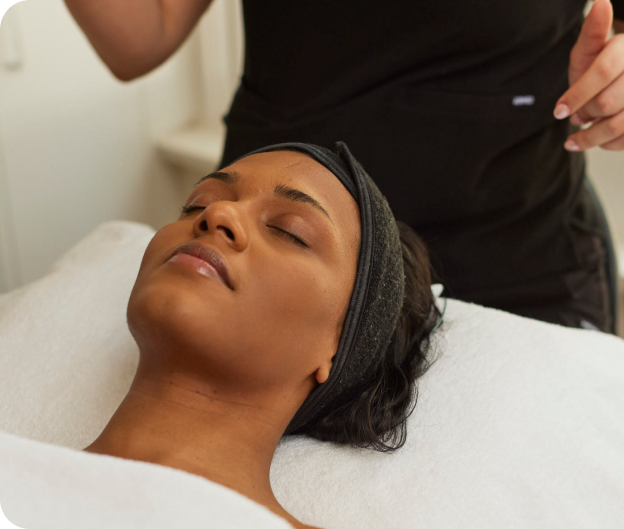Dermatologists now know that acne is a chronic disease, with recent studies showing that acne results in higher rates of depression. That’s why at Skindepth we believe in producing a life plan to both control, and keep pimples away for life. Dr Alice Rudd treats acne in all age groups but has a special interest in acne affecting post-adolescent females. She sees the all-to-common scenario of cystic acne appearing when women come off the contraceptive pill. She also deals with women who battle acne in the context of underlying hormonal issues such as polycystic ovarian syndrome.
Skindepth use a variety of medical and non-medical treatments to manage acne and always adopt a multidisciplinary approach employing other hand picked health specialists from our network if needed.

Acne (pimples) is a chronic condition, that affects teenagers, and adults. It is the result of increased hormonal activity (androgens) that results in increased production of oil (sebum) in the skin. This oiliness clogs the pores (sebaceous glands) which allows bacteria to grow. Inflammation (redness, lumps and cysts) and pus develops. Acne can lead to scarring even if you do not pick your pimples. Acne often runs in families and in some cases may be related to underlying hormonal or medical issue. In some cases it may be related to medications taken.
Acne is common particularly in women in their 20s and 30s. We see this mostly as a result of ceasing the contraceptive pill (for child bearing or other reasons). Many women did not even know they had acne, or were put on the pill early in life to control teenage acne. There may be underlying hormonal factors that need to be considered. Acne in this time of life presents a management dilemma, as most treatments can’t be given when wanting to conceive. Usually we recommend medical treatment to get the acne quickly, and hopefully permanently controlled. If medical treatment is not desired, we devise topical medicated regimes in combination to treatments to get the best results.
Treatment of acne generally involves reducing the oil in the skin, clearing out the pores and controlling any inflammation. Treatment usually starts topically with a range of skin products or prescription grade retinol and antibiotics. Oral agents may also be required. These can be oral antibiotics, oral hormonal treatments, or oral isotretinoin.
While acne treatment predominantly has a medical influence, the Skindepth team believes that acne should also be treated from the inside. This holistic approach involves evening out the hormones, modifying your diet and reducing levels of inflammation inside your body.

Skindepth’s Acne Clinic is a service dedicated to treating acne sufferers. The clinic provides a tailored approached with the use of dermaceutical-level products and treatments. All initial consultations will be undertaken by one of Skindepth’s acne experts, who are experienced in treating acne-prone skin (Dermal Clinician).
In the Acne Clinic consultation you will:
· discuss and set skin goals
· receive a thorough skin assessment
· receive an integrated and customised plan
This skin plan will include recommendations such as skincare products and in-clinic treatments that will reduce inflammation and breakouts, treat scarring and improve the skin’s texture. Dietary recommendations and other lifestyle information will also be provided.
Patients that require further assessment will be fast-tracked to see Dr Alice Rudd for a medical consultation. During this appointment all medical treatment options will be discussed and formalised as part of the skincare plan. Skindepth’s Acne Clinic provides the perfect opportunity for their clients to get on top of their acne without long wait periods for consultation appointments.

Chemical peels are a widely used treatment to help manage acne. They are oftenadded into therapies like retinoids and antibiotics. Countless studies have supported the efficacy for acne peels in diminishing breakouts and improving skin texture and tone. A series of acne peels can show improvement over a short period of time. The most commonly used chemical peels in treating acne are salicylic acid, resorcinol, lactic acid, pyruvic acid and TCA and are tailored to an individuals type of acne.
Often acne leaves marks on the skin that are discolored. Redness, pigmentation and scarring are real concerns of our patients.
Redness from acne (either active acne or old acne lesions) can be treated effectively with the Vbeam laser 2-3 treatments. Vbeam laser has an anti-inflammatory effect so may be helpful in acute active lesions, and is also effective at treating redness left as the result of previous pimples. We find once redness of the skin is controlled, our patients feel a lot better.
The Pastelle pigment laser is effective at treating some of the post inflammatory pigmentation that results from old acne lesions.
LED light therapy actively controls and reduces inflammation caused by acne and helps active lesions heal more quickly and relieves pain associated with acne lesions. It promotes rejuvenation of the skin by treating down to a cellular level.
Venus Viva is an advanced NanoFractional Radio Frequency technology is a non invasive treatment that creates ablation, coagulation and resurfacing of the skin for mild to moderate acne scarring. Needle-shaped pins penetrating through the top layer of the skin to trigger the skins own natural healing process and remodel the collagen that is damaged in the acne scarring process.
Fractionated laser creates columns of skin wounds that encourages the skin to regenerate new healthy tissue. The technology also leaves columns of skin in tact so that side effects are few and downtime and recovery periods are minimized. The Fraxpro 1550 technology penetrates deep into the dermis where the majority of atrophic scarring sits and repairs the damaged skin on a cellular level. Several treatments for acne scarring may be required and its important to note that acne scarring often takes a variety of treatment modalities.
Sometimes when acne scarring is very deep and has created a significant textural abnormality that is not treatable with other modalities we call in the big guns. Ablative co2 and erbium lasers create wounds in the skin that affects all the skin (unlike fractionated lasers which leave some of the skin intact) For this reason the ablative c02 laser is very effective but can carry risk. Often much fewer treatments are required with this type of laser for acne scarring due to the dramatic results.
TCA cross is for what we call ‘ice pick’ acne scarring. Ice pick acne scarring is a form of atrophic acne scarring that we need to treat on a deep level. Most other treatments cannot get to the depth of this treatment. The treatment involves the application of a 100% saturated tricholacetic acid with a tiny syringe or toothpick into the acne scar. Immediately the skin frosts white and then over a period of a few days darkens and then eventually sheds off, leaving the appearance of a shallower ice pick acne scar.
-
How is acne severity graded?
Acne is graded according to severity and type. The most common types of acne are comedomal, pustular and cystic. Nodular cystic acne is the most severe type of acne and can lead to scarring in many cases. Each type of acne requires a different type of treatment and can be treated with medication or without.
-
Why adults get cystic acne?
Acne can persist into adulthood for a number of reasons. One of the main reasons is hormones such as menopause or polycystic ovarian syndrome, or more commonly acne in the 30s as a result of ceasing the combined contraceptive pill. The usual reason is genetics, or inadequate treatment of teenage acne.
-
Why is acne chronic?
Acne is no longer thought of as a teenage disease. In many cases it persists into adulthood and is considered a chronic disease now. That is why it is important to have a long term treatment plan for those with chronic acne and acne scarring.
-
What medications are used for acne treatment in Australia?
In Australia the common treatment pathway for acne is to start with topical prescription retinoids such as tretinoin .05 or adapalene. For pustular acne an topical antibiotic such as clindamycin would ne used. Skincare for acne is also important using ingredients such as salicylic acid and niacinamide.
-
What are the best treatments for teenage pimples?
As Teenagers become hormonal, the change in hormones can lead to break outs In the skin. As a teenager it is important to not over clean or strip the skin. A gentle foaming cleanser is a good start followed by a niacinamide containing light moisturizer. It is best to go for non-comedogenic products. Diet is important in teenage acne, avoiding large amounts of skim dairy and processed sugar. Mineral make up is recommended for teenage acne, and only in small amounts. At Skindepth we treat teenage acne with skin extractions, peels and other skin treatments in combination with a take home skin care plan.
-
How to treat acne without medication?
Acne can be treated with simple measures such as attention to diet and avoidance of triggers for acne. At Skindepth we commonly treat acne without medication. We employ a combination of tailored skin care with skin treatments such as hydroxy acid peels, LED light, extractions and lasers. Skin care at home is an integral part of the treatment.
-
How long do I have to take the medication for?
A 'course' is calculated from your weight, so it is tailored
to the individual. We calculate how many milligrams you are required to take to get a therapeutic effect. Depending on the amount you take per day, will determine how
long it takes you to reach this
cumulative dose.For example: if you take 10mg daily, it might take you roughly two years or sometimes more depending on your weight, to finish the course, however if you increased to 20mg, this time is halved, and even more so if you increase to 30mg or 40mg.
-
What are the most common side effects?
Oral vitamin A works by reducing the amount of oil being produced by the skin, therefore general dryness is the most common side effect. Here are a few tips to help with these common side effects:
Dry lips: we recommend keeping a lip balm on you at
all times, we like the 'dermal' lip balm or Avene 'cold cream' lip balm.Dry eyes: over the counter lubricating eye drops can be used, such as Systane
or Poly Tears.Dry nose: You may find that you get a dry irritated nose
which can make you prone to nose bleeds, over the counter FLO Nozoil can be used, otherwise a bit of Vaseline on a cotton bud can be applied up the nose to help moisturise.All over body dryness: It is important for anyone to keep their whole body moisturised, this means reducing the time and temperature of your showers (water is very drying!) and using a soap substitute as well as a moisturiser after the shower. We like all products by Aveeno and QV.
Headache- not a common side effect but has been noted to occur at times on the medication, especially on higher doses.
Oral Vitamin A must be taken with food, usually the 'fattiest' meal of the day which is dinner for most people, this will avoid any stomach upset.
-
I'm getting married and planning a family next year so I want to be off the medication by a certain time, what can I do?
If we have a time frame of an event like you’re wedding
or you're starting a family, we need to fast track the course and people will increase the dose (if tolerable) This may mean seeing the dermatologist more regularly than 4 months as we need to monitor you more closely.In some circumstances, we can stop the treatment before reaching the cumulative dose, the only risk of doing this is that you have an increased chance that the acne will reoccur down the track.
-
I would prefer to stay on a lower dose, can I do that? Is there any harm in staying on the medication long term?
There's absolutely no harm in taking a low dose long term, as mentioned above, it will just take you much longer to reach that cumulative dose and you can't get pregnant while on the medication.
-
I want to increase my dose, is that okay?
Yes, that is fine. We recommend you don't increase too quickly at the start due to a risk of a flare but once you have completed the first few months of being on 10mg, you may increase.
If you feel like the side effects are unmanageable, you can decrease backdown, but please keep a record of these doses as it will help us calculate your dose to date when you come in for your appointments.
-
Can I take vitamin supplements while on the medication?
Yes you may take vitamins while on the medication, anything you're unsure of please ask us.
-
I'm nervous about the chance of an initial flare up, what can I do to help or prevent this?
Follow the instructions with how to introduce
the vitamin A, this slow introduction will lower the chances of a flare. Be kind to the skin, give it time. Unfortunately, you won't see any improvement overnight, all treatments take a few months to have an effect. Your
Dermatologist may prescribe a short course of antibiotics if they think you’re at risk of an initial flare.Our Dermal Clinicians are also always available to see you to discuss skincare or cosmetic treatments such as LED light and extractions which can help speed up the process. -
I have been on the medication for one month and I haven't noticed a difference yet?
As stated above, patience is key. Everyone's results vary, some may notice an improvement after one month, and others may take 4-6 months.
-
Are there any skincare tips during treatment?
Skincare whilst on oral vitamin A should be gentle, let the medication do all the work and nurture the skin with a cream cleanser such as Avene gentle
cleanser and a moisturiser such as Avene Skin Recovery (both available at our online store)Do1s and Don'ts:
DO keep the skin moisturised. We know you may be used to trying to dry out the acne, however the medication will take care of this so it's important to keep the skin barrier intact and hydrated.
DO wear your sunscreen. This is very important! Vitamin A makes you more sun-sensitive,
therefore a sunscreen should be worn every day. Gone are the days of greasy sunscreens for the face, try the beautiful La Roche PosayUltra light or Anti-shine (both available on our website)
DON'T use any topical acne products such as benzyl
peroxide that you may have used previously, these will be too drying and irritating on the skin.DON'T use any topical Vitamin A containing products, commonly known as retinol, you are taking this orally so we don't want an overdose.
'Active1 skincare can be used, the only two things to avoid are the Vitamin A (retinol) and Glycolic acid.
-
How about wanting to conceive?
You will be safe to start trying for a family one month after stopping the medication.
-
How about wanting to conceive?
You will be safe to start trying for a family one month after stopping the medication.
-
Is there any other important information?
If you experience any changes in your mood, please book an appointment to speak to one of the Dermatologists.
If you have been on Doxycycline, you need to have stopped this 4 weeks prior to starting the oral vitamin A.
You will be required to attend a follow up appointment every 4 months while on the medication.
Skin Conditions
Acne Dull Skin Enlarged Pores Pigmentation & Discolouration Redness Wrinkles & Volume Loss- Choosing a selection results in a full page refresh.
- Opens in a new window.
